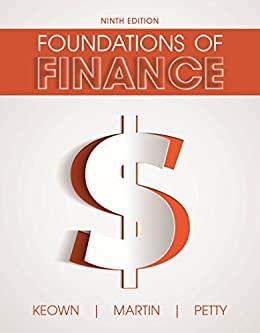Saddle River Operating Company (SROC) is a Dallas-based independent oil and gas firm. In the past, the
Question:
Saddle River Operating Company (SROC) is a Dallas-based independent oil and gas firm. In the past, the firm's managers have used a single firm-wide cost of capital of 11 percent to evaluate new investments. However, the firm has long recognized that its exploration and production division is significantly more risky than the pipeline and transportation division. In fact, firms comparable to SROC's E&P division have equity betas of about 1.4, whereas distribution companies typically have equity betas of only 0.7. Given the importance of getting the cost of capital estimate as close to correct as possible, the firm's chief financial officer has asked you to prepare cost of capital estimates for each of the two divisions.
The requisite information needed to accomplish your task is presented here:
• The cost of debt financing is 7 percent before taxes of 35 percent. However, if the E&P division were to borrow based on its projects alone, the cost of debt would probably be 9 percent, and the pipeline division could borrow at 5.5 percent. You may assume these costs of debt are after any flotation costs the firm might incur.
• The risk-free rate of interest on long-term U.S. Treasury bonds is currently 3.1 percent, and the market-risk premium has averaged 5 percent over the past several years.
• The E&P division adheres to a target debt ratio of 10 percent, whereas the pipeline division utilizes 40 percent borrowed funds.
• The firm has sufficient internally generated funds such that no new stock will have to be sold to raise equity financing.
a. Estimate the divisional costs of capital for the E&P and pipeline divisions.
b. What are the implications of using a company-wide cost of capital to evaluate new investment proposals in light of the differences in the costs of capital you estimated previously?
Cost Of CapitalCost of capital refers to the opportunity cost of making a specific investment . Cost of capital (COC) is the rate of return that a firm must earn on its project investments to maintain its market value and attract funds. COC is the required rate of... Cost Of Debt
The cost of debt is the effective interest rate a company pays on its debts. It’s the cost of debt, such as bonds and loans, among others. The cost of debt often refers to before-tax cost of debt, which is the company's cost of debt before taking... Distribution
The word "distribution" has several meanings in the financial world, most of them pertaining to the payment of assets from a fund, account, or individual security to an investor or beneficiary. Retirement account distributions are among the most...
Step by Step Answer:

Foundations Of Finance
ISBN: 9780134083285
9th Edition
Authors: Arthur J. Keown, John H. Martin, J. William Petty





